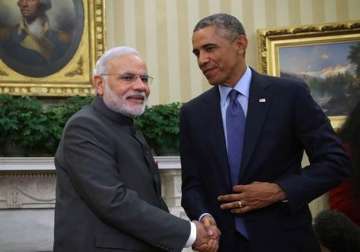New Delhi: Sunday's visit of US President Barack Obama is being seen with high expectations with respect to the Indo-US ties. There are several big issues which might be addressed, like Indo-US Civil nuclear deal, defence and security ties, climate change and economic concerns.
When asked that what does Prime Minister Narendra Modi wants to achieve in particular from the visit, an aide answered, “He (Modi) wants to reflect officially the favourable sentiment Indians have of the US. He wants to “embed” the US in his grand India project.”
He told to Times of India newspaper, “It will be an event which isn't in doubt. Expect the unexpected – a joint radio conversation going beyond protocol, etc. It could be the “coming out” moment of Indo-US ties, taking natural convergences to the next level.”
As is described by MEA also, the visit will be a “culmination of a qualitative reinvigoration of ties following the meeting between PM Modi and President Obama in September.”
Talking about the deliverables from the visit. Currently, following is on the platter –
1) A breakthrough is highly expected in the Indo-US civil nuclear agreement which is stuck since 2008. There are three components wedging the deal – administrative issue on ‘perpetuity rights of material checking' to US, India's liability law and facilitation of the Indian membership to the four global non-proliferation regimes.
Although the liability issue is unlikely to be solved, however, both sides are looking at “forward-looking language” that could lend the law respectability, if the government approves the Convention for Supplementary Compensation (CSC) for nuclear damage. India signed this convention in 2010, but refrained from approval because of concern that our laws are incompatible with CSC.
2) In Defence, the 2005 framework pact will be renewed. Apart from it, foundational agreements on three deals that allow greater sharing of technology, bases and information between the two countries (CISMOA, LSA and BECA) is also expected.
Since FDI is being expected in defense by Modi, India can look forward to more “co-development” issues.
3) In Energy, a part of discussions will be based on renewable and fossil fuels. The idea is to ensure that by the time India opens up for the Paris Conference, it can make an emission cut commitment.
4) Counter-terror talks will also be high on agenda. There will be a conversation on the future of Pakistan and Afghanistan. A revival of the trilateral dialogue with Afghanistan is also on the cards.
Home Minister Rajnath Singh will probably travel to US for his first counter-terror dialogue with counterpart Jeh Johnson.
